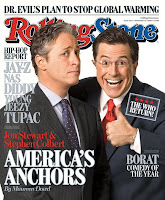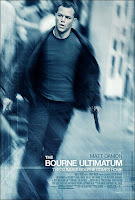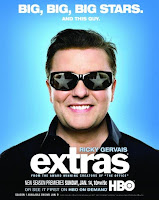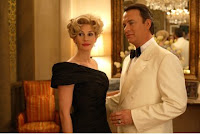The first television shows to be effected by the strike were officially the first shows to return with new episodes. Late night television has been airing reruns since early November, and with the return of Comedy Central’s late night lineup all the late night shows are back and running.
One show was back earlier than others. December marked the return of Last Call with Carson Daly without writers, and if this is news to you it’s because you weren’t aware there were shows on at one thirty in the morning.
The mainstream shows of late night returned on January 2nd. Late Show with David Letterman and Craig Ferguson’s Late Late Show both returned after Letterman’s production company struck a deal with the writers that would allow them to go back to work. The Tonight Show and Late Night were not able to reach such a deal because of the way they’re produced, which meant that NBC’s late night lineup returned without writers in an effort to combat CBS.
Letterman and Craig Ferguson’s Late Late Show both returned after Letterman’s production company struck a deal with the writers that would allow them to go back to work. The Tonight Show and Late Night were not able to reach such a deal because of the way they’re produced, which meant that NBC’s late night lineup returned without writers in an effort to combat CBS.
In this first week ratings have been up for Late Show, Late Late Show, The Tonight Show, and Late Night, as curious fans returned in mass after two months of reruns. So far The Tonight Show and Late Night have been winning their time slots. It’s too early to tell whether this trend will continue, but recent number slides by The Tonight Show and Late Night would indicate that people originally tuned in to see how these hosts would do without writers and that the novelty is wearing off.
It would seem that the Late Show and the Late Late Show may begin to see benefits from the strike, since those shows have writers and will attract high caliber guests that wouldn’t be seen on NBC crossing picket lines.
In the week since late night has returned I’ve sampled all the late night programming except the Late Late Show (Ferguson hasn’t been funny since he left Drew Carey), ABC’s Jimmy Kimmel Live! (yeah he’s funny, but there’s only so much time in the day), and Last Call with Carson Daly (even I have standards).
Letterman’s Late Show returned to business as usual, except for the addition of a grizzly man beard on Dave, which he shaved on the air Monday, and the occasional, “union approved” joke. If you liked Letterman before, than you’ll be pleased with the quality of show he’s currently producing. Things aren’t so rosy with his competitor over on NBC.
The Tonight Show is struggling with Jay trying to carry the load all by himself, except for the help of his wife who approves his jokes and who he assigns the blame when his monologue bombs. Jay’s jokes lack their general polish, and his observational humor sometimes feels more like dinner conversation fodder than food for thought. His guests have been far from A-list, but the show has benefited from expanded time getting to know Jay’s personality, which is what wins over those older viewers and keeps him ahead of Letterman. Question and answer segments with the audience will be popular for another week or two, but after awhile it becomes apparent that Jay may be charming enough, but he’s not funny enough to keep viewers as he helms his one man show.
the help of his wife who approves his jokes and who he assigns the blame when his monologue bombs. Jay’s jokes lack their general polish, and his observational humor sometimes feels more like dinner conversation fodder than food for thought. His guests have been far from A-list, but the show has benefited from expanded time getting to know Jay’s personality, which is what wins over those older viewers and keeps him ahead of Letterman. Question and answer segments with the audience will be popular for another week or two, but after awhile it becomes apparent that Jay may be charming enough, but he’s not funny enough to keep viewers as he helms his one man show.
Conan O’Brien’s Late Night hasn’t suffered the same way as its lead in. The show is definitely different, choosing to fill time with Conan playing guitar and spinning his wedding ring rather then pull the Walker Texas Ranger lever, but it’s still really entertaining. The one precursor to such an exclamation is that if you didn’t like Conan before, than you definitely won’t like him now in the expanded version. Late Night now revolves solely around Conan’s quick wit and showmanship, both of which are top notch and keep the show funny. Maybe after a month or so Conan will start to wear on my nerves the way he does for some already, but for now I like the fact that he just bursts into his own rendition of “Blue Moon of Kentucky.”
Comedy Central’s lineup returned a week later and is suffering from the writer’s strike. The quality of The Daily Show was definitely lacking, as the middle segment that usually involves a correspondent story was absent because of the writer’s strike. This meant the show fell solely on the back of Jon Stewart, and after his first night without writers I don’t think he’s up to it. I’ve never been impressed by Stewart’s interviews, which are generally the weakest part of the show and have now been expanded into two segments. Over the past year I’ve basically turned my back on what was one of my favorite shows because Stewart was becoming a know it all and was generally off putting. Stewart isn’t funny enough to adapt his show the way Conan has, he doesn’t have the personality to carry his show like Leno, and he doesn’t have the writers Letterman’s got to make up for his own shortcomings.
basically turned my back on what was one of my favorite shows because Stewart was becoming a know it all and was generally off putting. Stewart isn’t funny enough to adapt his show the way Conan has, he doesn’t have the personality to carry his show like Leno, and he doesn’t have the writers Letterman’s got to make up for his own shortcomings.
The Colbert Report reemerged as if almost nothing had changed, except for the pronunciation of the show’s title. The Colbert Report has always revolved around the character Stephen Colbert had created, and that’s why it should be able to survive without writers. The absence of writers does mean the disappearance of the popular segment, the “Word,” but it also means more Colbert. The Colbert character is hilarious whether on Meet the Press, conducting interviews, or just explaining why he’s against the writers. Again, if you didn’t like Colbert before, than you’ll probably hate him now, but if you were a devoted fan of the Colbert Nation before you’ll want to tune in to new episodes.
Late night television has always been about people welcoming a host into their bedroom and taking part in an intimate relationship. That’s why personality matters so much in the late night game, and why the absence of writers on certain shows may not affect what people watch. Just because Letterman has better jokes and better guests may not lead people to abandon Jay in his time of need. On the other hand, college students will probably play Halo 3 before they turn to mainstream late night for entertainment if they decide to abandon Comedy Central. It’s hard to predict where people’s tipping points will be with regards to when they decide to change the channel or just choose to tune out, but it should be interesting to watch.
 In case you really miss the writers, and Letterman’s don’t cut it for you, I’d recommend watching the best of The Larry Sanders Show on DVD. This was a show that ran for six seasons on HBO during the 90s and revolved around fictional late night host Larry Sanders (Garry Shandling). The guests are real, and better yet you get to see and hear what happens after the cameras stop rolling. The show is brilliant and brings out amazing performances from Rip Torn and Jeffrey Tambor.
In case you really miss the writers, and Letterman’s don’t cut it for you, I’d recommend watching the best of The Larry Sanders Show on DVD. This was a show that ran for six seasons on HBO during the 90s and revolved around fictional late night host Larry Sanders (Garry Shandling). The guests are real, and better yet you get to see and hear what happens after the cameras stop rolling. The show is brilliant and brings out amazing performances from Rip Torn and Jeffrey Tambor.
 songs restrict the story and make it way too hokey, and the interpretation of the Beatles’ music is all over the place.
songs restrict the story and make it way too hokey, and the interpretation of the Beatles’ music is all over the place. 






































